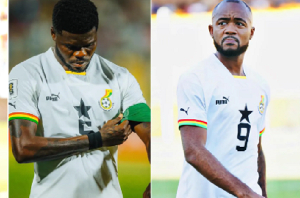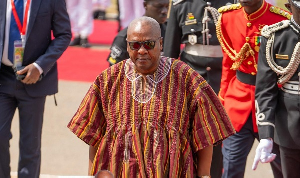Election 2012 and the New Patriotic Party (NPP) Quandary – A Case Study
Ghana's general election was held on Friday 7 December 2012 to elect a president and members of parliament in 275 electoral constituencies. Owing to the breakdown of some biometric verification machines, some voters could not vote, and voting was extended to Saturday 8 December 2012 (BBC, 2012). Competing for presidency were incumbent president John Dramani Mahama of the National Democratic Congress, his main challenger Nana Akufo-Addo of the New Patriotic Party and six other candidates.
Though the system for the presidential vote is basically a two-round system, incumbent president John Mahama was declared winner of the election by the Electoral Commission of Ghana with 50.7% of the vote, negating the need for a run-off election. Nana Akufo-Addo received 47.74% (Electroral Commission of Ghana, 2012). The NPP alleged tampering of the final electoral results by the Electoral Commission of Ghana (EC), and filed a petition at the Supreme Court of Ghana (SC) to review the election results (Myjoyonline News, 2012). This process, in which the NPP candidate and two other people have taken the Electoral Commission and the NDC candidate to the highest court of the country, was finally resolved on the 29 August 2013, when in a landmark decision, the SC dismissed all the reliefs sought by the petitioners and upheld the results that was certified and announced by the EC. In so doing, the SC upheld that John Dramani Mahama, the NDC candidate, was duly elected as President of the Republic of Ghana (Judicial Service of Ghana, 2013).
Without prejudice to the outcome of the filed suit and ruling of the SC, A Post election study was conducted, to find out from a random group of Ghanaians, why in their opinion, NPP lost the presidential elections and what they think will be the way forward to reorganize and restrategize to ensure electoral success in future elections conducted in Ghana.
Methodology
A qualitative research approach was used, by selecting 100 random participants ( N= 100) from participants on the social networking site Face book© by sending them the link to the online survey site (Creswell,2008).The open -ended questionnaire had two main questions and follow up questions that requested demographic details. 36 participants responded to the questions in the survey. The response rate was 36% (AAPOR, 2013). The responses were then collected and analyzed using SPSS © software for the descriptive analysis and manually themed. The participant took part voluntarily and it was very confidential.The themes from the data analysis and coding are outlined below.
Perception of Arrogance of Leadership and Members of NPP
About 22% of the respondents raised the issue of perceived arrogance of the leadership and Flag-Bearer of the NPP and cited it as a reason for not appealing to the Ghanaian voter. Some of the responses are quoted below: One respondent gave this answer, when asked why the NPP lost the election. “Perceived arrogance of the flag bearer and the utterances of the party leadership to the effect of the Party been associated with arrogance and tribalism”. Another respondent also gave this answer “Arrogance of its members most of whom belong to the higher echelons of the society and far removed from the realities on the streets”. A third responded has this about the Flag Bearer “Nana Addo is not liked by Ghanaians because of his perceived arrogance. And he has proved it on two occasions even by his attitude when he loses elections”.
Connection with the Grassroots
About 5.5% of the respondents linked the electoral loss to lack of touch and connections with the Ghanaian grassroots by the NPP. “They did not connect to the folks on the ground’’ was a response. They also blamed the inaction of the party’s members of parliaments, who were only engrossed in their elections at the expense of the presidential election. Some respondents also cited apathy as a result of imposition of unpopular candidates at the constituency by the NPP party headquarters in Accra.
Poor Communication of Party Spokes person and Party Manifesto
About 19% of the respondents linked the electoral loss on poor and sometimes contradictory presentations of the party spokes persons on the policies and ideas espoused in the electoral manifesto. The campaign messages were also skewed towards free education policy and nothing more’’ asserted one respondent. Their key message of free SHS was hollow and their spokespersons kept contradicting themselves on the issue replied another respondent.
Vitriolic Utterances and Perceived Violent Behaviour of Some Members of the Party
About 17% of the respondents had issues with the utterances and behaviour of some NPP members. This they attributed to the shunning of the party by some peace-loving Ghanaians. They also questioned why the leadership of the NPP could not bring these leading members to book in order to restore the image of the party. ‘Their posturing and messages towards the election did not foster peace in the country’. Key leadership of the NPP made statements which could be construed easily as vitriolic. ‘The leadership of the party failed to condemn utterances that were aimed at dividing the country along ethnic lines’. “The Gen. Sec was too militant and unreasonable in public pronouncements just like his NDC colleague. I personally wanted change but I didn't see anything
Perceived Ashanti/Akyem dominance of the NPP
About 11% of respondents linked the defeat to the perception of voters that NPP is not broad based ethnically and its structures and policies has ensured an Ashanti and Akyem dominance, which makes it very difficult for other ethnic groups who are in the party and sympathize with the party to take up leadership roles. ‘The NPP needs to break that tribalism as portrayed by the just ended elections, everything must be done to appeal to the other tribes’’. “They NPP do not welcome other tribes apart from Ashanti and Akyems. They claim they do but it's not felt’’.
Illiteracy of Voters
About 8.3% of the respondents linked the defeat to illiteracy of voters. “Illiteracy level in Ghana is low and therefore voters have no foresight ’’. High illiteracy rate among registered voters was cited by a respondent.
Vote Manipulations and Electoral Fraud
About 14 % of the respondents attributed the loss to vote manipulations and electoral fraud by the EC to favour the NDC. “It is pretty obvious that such a loss is artificial i.e. stolen verdict”. One respondent also linked it to an orchestrated fraud using high technology/IT to manipulate the results. There was a respondent who believed that the NDC did not win the election.
Lack of vigilance and ignorance of Party Agents at Polling Points
25% of respondents blamed the party agents for being slack and complacent at the polling points and they attributed it to training and lack of motivation. “The ignorance of our party's polling station assistants and the unpreparedness of our party officials played a key role here, where I cast my vote for instance the NPP agent there could not even sign his signature and mixed small and capital letters in writing his name” was a response from a respondent.
Other factors Captured
One respondent attributed the blame for the loss to destiny i.e. that the NPP was destined to lose the election. Another attributed it to internal wrangling between Parliamentary Candidates and party officials at the constituency level. One respondent also cited the old age of the flag bearer as an issue. The issue of operational members of the NPP headquarters relinquishing their core responsibility of coordinating the electoral machine to take part in parliamentary elections was also cited. Finally one respondent attributed the loss to wrong choice of parliamentary candidates in certain constituencies.
The Way forward for NPP
Respondents were asked to suggest possible solutions and way forward to re-strategize and organize for future electoral victory. This is a summary of some of the recommendations given by respondents in this study.
Party Communication and Public Relations
The NPP needs to get plugged in with the folks in the rural areas and their communication persons should avoid loose talks on TV and on air etc. ‘Kennedy Agyapong's utterances did not help at all’ was a respondent’s comment. ‘We should look for fluent and intelligent people to represent us at all times during TV or radio discussions and we should be circumspect in our choice of words at all times’’ noted a respondent. The party needs to freshen its communication team. Respondents tasked the NPP supporters to desist from using bad words that could be misinterpreted. ‘Most of the NDC party support was drawn from the opposition because of the "All die be die" comment as well as other unnecessary comments made by the party leadership’ was a comment from a respondent. ‘Politics should not be conducted in such a dirty way’ commented a respondent. The party should revise its message and make it more open to cover entire economy, pension, health, fisher folks, farmers and the industry make the next election about NDCs record. The party need to have a broad scope and tackle issues rather than attacking the NDC on all their policies, even when that policy is a good one. NPP Parliamentarians should be seen to be giving the government’s alternative policies than just saying no to any governmental policy. NPP’s alternative as a party
Party Agents and Polling Administration
Respondents perceived that the NPP must have dedicated and serious agents for the party. The agents must think wide outside the box on any possibility the opponent can use to outsmart the party. The party needs to have serious minded and dedicated agents who would be very vigilant. The NPP should also call for CCTVs and video coverage to be used at the polling stations to enhance the free and fair results.
The respondents recommended that the party needed more experienced people in the polling management team. NPP’s research and elections office was found wanting and had conflicting communication when the EC decided to allow voting into the second day. NPP was not prepared for this. The party was not sure how their reps in the strong room certified results without confirming with the party. The party should improve on the ability to get supporters to register and also get them to vote on voting day. The party agents must be highly motivated and educated on electoral processes and procedures to ensure a high level of diligence were some of the recommendations given.
Perception of Elitism and Arrogance
The respondents were of the opinion that the NPP needs leadership overhaul based on the above submission. The party should seriously work on the perception that NPP as an elitist party, Pronouncements that tend to deepen polarization of the electorate and fan ethnicity, breaking the myth about the party being an Asante Akyem party and achieving a broader base of support. Winning elections in only 2 regions is not satisfactory. The party needs to work on the rural folks because most of them are not educated and are easily convinced by all kinds of lies and information. A lot of negative things have been put in their minds about the NPP.
Party Reorganization and Succession Plan
Respondents recommended that the party must empower the youth and stop the idea of generational succession and perceived ethnic ‘round-robin’ of Asantes and Akims. The NPP needs young, vibrant and dynamic persons to be in leadership positions. They need the requisite mentorship and ‘curing’ from the older generation, for the flagbearership, respondents were of the opinion that a more youthful and perceived ''non abrasive'' ethnically accepted candidate will be the best to match the NDC’s candidate boot for boot. Respondent urged the older party members to use their experience and wisdom to provide needed positive guidance.
Ethnic Voting Trends and Perceptions
Respondent were of the opinion that, the NPP performed poorly in the coastal areas, zongos and the Volta Region during the 2012 elections. They perceived that the NPP needed to re-orient and repackage their political image to appeal to these groupings that keep voting against the party. Some of the respondents were of the opinion that the NPP was ‘Akanized’ and that perception needed to be erased by opening up leadership positions to more members who were outside the perceived ‘Akan’ block. They tasked the NPP to find out why the opposition (NDC) keeps increasing in numbers in party strongholds especially Ashanti Region. The Party should move away from the perceived dominance of Ashantis and Akyems in flag-bearer ship and open up the leadership platform to include people from the Volta Region, Northern Region, Greater Accra and other regions The flag bearer should have the positive qualities to take on the opposition (NDC) on pragmatic and real time national issues devoid of the usual acrimony of ethnicity and elitisms. Respondents were of the opinion that any future Flag bearer should be humble, influential, and dynamic and a charismatic person for that matter. Respondents also tasked the NPP, to seriously rebrand particularly in the Upper and Volta Regions.
Conclusion
This particular research was conducted to sample the opinions of small cross sections of Ghanaians and showed that the NPP will have to carve a new image for itself, by reorganizing its internal structures to appeal to a wider base of the Ghanaian populace, if it wants to capture political power. Some of the perceptions of the party by respondents were elitism, arrogance, ineffective and indecent party communicators on public media, limited political agenda and manifesto, inadequate training for grassrootparty agents, internal strife hinging on ethnicity and a host of others. Respondents were of the opinion that the NPP needs to introspect and present a presidential candidate with a broader national appeal, ethnically progressive and inclusive and above all with a manifesto that will be pragmatic. The respondents recommended the NPP, to come up with a manifesto which will provide a strong viable alternative to the ruling government policies and must be attainable and comprehensible to the average Ghanaian. This study sought to be a frame work for further research to validate and come up with more conclusive findings and recommendations. Respondents were of the opinion that the NPP should commence an immediate in-house audit and forensic analysis of the electoral results and outcomes to lay out the strong foundation, if it wants to attain electoral victory in election 2016.
Odadie Kwasi Okatakyie Adjekum
kadjekum@yahoo.com
Opinions of Saturday, 28 September 2013
Columnist: Adjekum, Odadie Kwasi Okatakyie


















